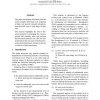Free Online Productivity Tools
i2Speak
i2Symbol
i2OCR
iTex2Img
iWeb2Print
iWeb2Shot
i2Type
iPdf2Split
iPdf2Merge
i2Bopomofo
i2Arabic
i2Style
i2Image
i2PDF
iLatex2Rtf
Sci2ools
126
click to vote
SIGDIAL
2010
2010
A unified account of the semantics of discourse particles
The paper investigates discourse particles on the example of German doch, assigning to them very specific semantic interpretations that still cover a wide range of their uses. The analysis highlights the role of discourse particles in managing the common ground and crucially takes into account that discourse particles can refer not only to utterances they are a part of and to previously uttered utterances, but also to felicity conditions of these utterances.
Discourse | Discourse Particles | Natural Language Processing | Semantic Interpretations | SIGDIAL 2010 |
| Added | 15 Feb 2011 |
| Updated | 15 Feb 2011 |
| Type | Journal |
| Year | 2010 |
| Where | SIGDIAL |
| Authors | Markus Egg |
Comments (0)

